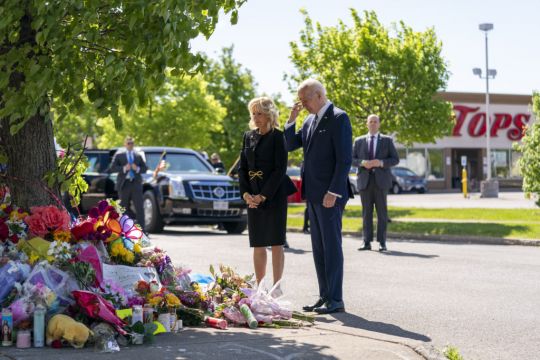President Joe Biden and first lady Jill Biden paid their respects at a makeshift memorial to the 10 people killed in the white supremacist attack in Buffalo, confronting again the forces of hatred he once said called him back to seek the White House.
Just off Air Force One, the first couple laid a bouquet of white flowers at the memorial of blossoms, candles and messages of condolence outside the Tops supermarket, where on Saturday a young man armed with an assault rifle targeted black people in the deadliest racist attack in the US since Mr Biden took office.
The Bidens were meeting privately with families of the victims, first responders and local officials before the president was to deliver public remarks, in which he planned to call for stricter gun laws and urge Americans to reject racism and embrace the nation’s diversity, the White House said.
It is a message that Mr Biden has delivered several times since he became the first president to specifically address white supremacy in an inaugural speech, calling it “domestic terrorism that we must confront”.
Jill and I pray for the victims, their families and devastated community from yesterday’s mass shooting in Buffalo, New York. Our hearts are heavy once again but our resolve must not waver; we must work together to address the hate that remains a stain on the soul of this nation.
Advertisement— President Biden (@POTUS) May 15, 2022
However, such beliefs remain an entrenched threat at a time when his administration has been focused on addressing the pandemic, inflation and the war in Ukraine.
The White House said the president and the first lady will “grieve with the community that lost 10 lives in a senseless and horrific mass shooting”.
Three more people were wounded.
Nearly all the victims were black, including all of those who died.
On Monday, Mr Biden paid particular tribute to one of the victims, retired police officer Aaron Salter, who was working as a security guard at the store. He said Salter “gave his life trying to save others” by opening fire at the gunman, only to be killed himself.
Upon arrival in Buffalo, the president and New York’s two senators were greeted by Governor Kathy Hochul, Buffalo mayor Byron Brown and local police and fire officials.
The shooter’s hateful writings echoed those of the white supremacists who marched with torches in 2017 in Charlottesville, Virginia, a scene that Mr Biden said inspired his decision to run against President Donald Trump in 2020 and that drove him to join what he calls the “battle for the soul of America”.

“It’s important for him to show up for the families and the community and express his condolences,” said Derrick Johnson, the president of the NAACP.
“But we’re more concerned with preventing this from happening in the future.”
It is unclear how Mr Biden will try to do that.
Proposals for new gun restrictions have routinely been blocked by Republicans, and racist rhetoric espoused on the fringes of the nation’s politics has only grown louder.
Payton Gendron, 18, was arrested at the supermarket and charged with murder. He has pleaded not guilty.
Before the shooting, Gendron is reported to have posted online a screed overflowing with racism and antisemitism.
The writer of the document described himself as a supporter of Dylann Roof, who killed nine Black parishioners at a church in Charleston, South Carolina, in 2015, and Brenton Tarrant, who targeted mosques in New Zealand in 2019.

Investigators are looking at Gendron’s connection to what is known as the “great replacement” theory, which baselessly claims white people are being intentionally overrun by other races through immigration or higher birth rates.
The claims are often interwoven with antisemitism, with Jews identified as the culprits.
During the 2017 Unite The Right march in Charlottesville, the white supremacists chanted “Jews will not replace us”.
“Many of those dark voices still exist today,” White House press secretary Karine Jean-Pierre said on Monday.
“And the president is determined as he was back then . . . to make sure we fight back against those forces of hate and evil and violence.”
In the years since Charlottesville, replacement theory has moved from the online fringe to mainstream right-wing politics.
A third of US adults believe there is “a group of people in this country who are trying to replace native-born Americans with immigrants who agree with their political views”, according to a poll conducted in December by The Associated Press and the NORC Centre for Public Affairs Research.







